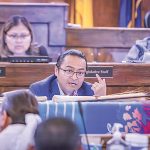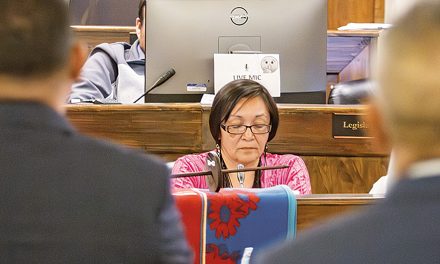
50 Years Ago: Flags at half-staff for veterinarian
Flags on the Navajo Reservation were flown at half-mast part of this week in connection with the tragic death of a young Navajo official.
The headline on the front page of the Navajo Times read “Navajo veterinarian dies.” Wilson Francisco was only 31 years of age when he died while camping near Prewitt.
The Times reported he died when he knocked over a gasoline can as he was crawling into his is sleeping bag. Medical officials said he died when the leaking gasoline asphyxiated him and during the night ignited.
At the time he was director of the tribe’s Range and Livestock Department. A 1959 graduate of Gallup High, Francisco attended Fort Lewis College and then got his veterinarian degree at the University of Colorado.
He was the first member of the tribe to earn such a degree and he served in that capacity for several years before being tagged by the new administration to be a tribal director. He was also at the time of his death on the board of the All Indian Rodeo Cowboys Association as well as a member of the tribe’s fair commission.
Well-liked by everyone he came into contact with, Navajo Tribal Chairman Peter MacDonald honored him for his work on behalf of Navajo ranchers and hoped that his life would encourage other young Navajos to become veterinarians.
1970 census
The Times also reported new figures from the 1970 census report that showed that the American Indians could no longer be called the “vanishing Americans.”
In fact, the census reported that the nation’s Indian population was growing at a far greater rate than the nation as a whole.
Officials for the Indian Health Service said the Native American population was reduced because of the high infant mortality rates. Census figures showed that the Navajo Reservation and its population had doubled since 1950 when the population was reported as 343,410. It rose to 723,746 in 1970.
When I wrote a story about this, I talked to tribal census officials who questioned that statement, saying that the census takers reported having a lot of problems in 1970 doing a reliable count on Indian reservations. This was due to the remoteness of many of the homes and a general distrust of census takers because of efforts in the past by federal officials who swooped in to “kidnap” children for boarding school or adoption to members of the Mormon Church and other faiths.
Those problems still existed in 1970 but federal census officials began working more closely with tribal officials to get a more accurate reading of the reservation populations.
Also, the 1970 census was the first that took a special effort to count those living on the streets of border communities.
The federal census office reported that the Navajo population was 107,675, which MacDonald said was nowhere near accurate. He estimated the tribe was closer to 120,000 and demanded that federal officials take a closer look at how the census was taken on the Navajo Reservation and revise those figures.
Police overtime pay
The Navajo Tribal Council is prepared to appropriate funds to pay members of the tribe’s police force for the overtime work officers performed for the tribe during the past year.
You will recall that this was one of the biggest demands made by the members of the police department when they held their first sick-out in the department’s history. The Council will be meeting just after Thanksgiving and MacDonald promised that this will be taken up and passed.
The question, however, is how far back the payments would go. The police workers want it to go back to Jan. 1, which will cost the government more than $3 million. The members of the Budget and Finance Committee have already made it known that the tribe can’t afford that much.
What is more likely is that the Council will approve a figure between $500,000 and $750,000. The Council also said there will be no discussions about increasing the salaries of police officers but theymay take it up sometime next year.
Studies done by the police department indicates that the salaries of tribal police officers is more than 25% lower than other local law enforcement agencies are paid. But it seems the police officers are willing to wait since paying for overtime for the first time would see the average pay increased by 30% or more.
Kennedy plans hearing
The Times has learned that U.S. Sen. Edward “Ted” Kennedy plans to hold a congressional hearing on the Navajo Reservation just after the Christmas holidays.
This is a continuation of Senate hearings that were held earlier this month in Washington, D.C., on possible conflicts of interest that tribal leaders feel is occurring within the U. S. Department of the Interior.
Tribal officials have argued for years that the Interior Department has favored the interests of other agencies over the well-being of tribes. This includes favoring water compacts that provide water from the Colorado River to non-Indian entities over tribal governments.
Kennedy has long been considered pro-Indian rights and tribal officials have expressed optimism that these hearings may force the Interior Department to fix this problem.
From a news angle, the fact that Kennedy plans to hold a hearing in Shiprock has become major news with media in the area making plans to cover his visit.








 Highway 264,
Highway 264, I-40, WB @ Winslow
I-40, WB @ Winslow